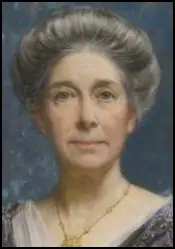Catherine Osler

Catherine Taylor was born in Bridgewater, Somerset, on 26th February 1854. Her mother, Caroline Taylor, was a founding member of the Birmingham Women's Suffrage Society. In 1873 she married Alfred Clarkson Osler, a wealthy glass manufacturer and a member of the Birmingham Liberal Association.
In 1881 Catherine Osler founded the Birmingham Ladies' Debating Society. Four years later she was appointed secretary of Birmingham Women's Suffrage Society. In 1888 she presided over a conference of the Women's Liberal Federation that was held in Birmingham.
Osler was a member of the executive committee of the National Union of Women's Suffrage Societies and she was opposed to the militant policies of the Women's Social and Political Union (WSPU). In an article in The Common Cause she attacked the actions of the WSPU.
Catherine Osler resigned as president of the Women's Liberal Federation in 1909 in protest against the government's policy of forcibly feeding hunger-striking suffragette prisoners. Her son, Julian Osler, was a member of the Men's League For Women's Suffrage. Her two daughters, Nellie and Dorothy, were members of the NUWSS.
Herbert Asquith and his Liberal Party government still refused to support legislation. At its annual party conference in January 1912, the Labour Party passed a resolution committing itself to supporting women's suffrage. This was reflected in the fact that all Labour MPs voted for the measure at a debate in the House of Commons on 28th March. Soon afterwards Henry N. Brailsford and Kathleen Courtney, entered negotiations with the Labour Party as representatives of NUWSS.
In April 1912, the NUWSS announced that it intended to support Labour Party candidates in parliamentary by-elections. The NUWSS established an Election Fighting Fund (EFF) to support these Labour candidates. Catherine Osler, who had been a long-time supporter of the Liberal Party, contributed generously to the EEF.
In July 1914 the NUWSS argued that Asquith's government should do everything possible to avoid a European war. Two days after the British government declared war on Germany on 4th August 1914, Millicent Fawcett declared that it was suspending all political activity until the conflict was over. Although the NUWSS supported the war effort, it did not follow the WSPU strategy of becoming involved in persuading young men to join the armed forces.
During the First World War Catherine Osler was a member of the executive of the Citizens Committee, which acted as a control committee for distributing grants to alleviate distress caused by the war.
Catherine Osler died on 16th December 1924.

